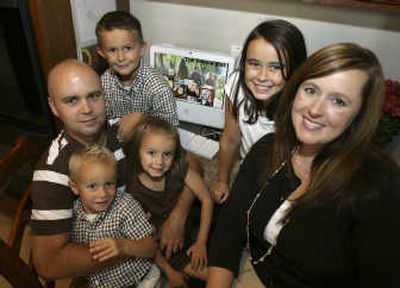First the birth certificate, then the domain name?

Besides leaving the hospital with a birth certificate and a clean bill of health, baby Mila Belle Howells got something she won’t likely use for several years: her very own Internet domain name. Likewise, newborn Bennett Pankow joined his four older siblings in getting his own Internet moniker. In fact, before naming his child, Mark Pankow checked to make sure “BennettPankow.com” hadn’t already been claimed.
“One of the criteria was, if we liked the name, the domain had to be available,” Pankow said. It was, and Pankow quickly grabbed Bennett’s online identity.
A small but growing number of parents are getting domain names for their young kids long before they can do more than peck aimlessly at a keyboard.
It’s not known exactly how many, but the practice is no longer limited to parents in Web design or information technology.
They worry that the name of choice might not be available by the time their babies become teens or adults, just as someone claimed the “.com” for Britney Spears’ 11-month-old son before she could.
The trend hints at the potential importance of domain names in establishing one’s future digital identity.
Think of how much a typical teen’s online life now revolves around Facebook or News Corp.’s MySpace. Imagine if one day the domain could take you directly to those social-networking profiles, blogs, photo albums and more.
“It is the starting point for your online identity,” said Warren Adelman, president of registration company GoDaddy.com Inc., which sells basic domain name packages for about $9 a year.
There’s no guarantee, though, that domain names will have as central a role in online identity.”Given the pace of change on the Net, it strikes me as a pretty impressive leap of faith that we’re going to use exactly the same system and the same tools … 15 to 20 years from today,” said Peter Grunwald, whose Grunwald Associates firm specializes in researching kids and technology.
Still, even if the effort is for naught, $9 a year is not a huge expense.
Parents not ready to commit or knowledgeable enough on how to buy a domain, though, are at least trying their luck with Hotmail or Gmail.
Although some parents have yet to use the domain names they’ve bought, others are sending visitors to baby photos, blogs and other personal sites. Domain name owners have a variety of options to have their personal sites hosted, typically for free or less than $10 a month. They include baby-geared services like TotSites.com and BabyHomePages.net.
There are downsides to all this, though: An easy-to-remember domain also makes a child easier for strangers to find. Chances are one only needs to know a child’s name and add “.com.”
Pankow, a database administrator in Phoenix, said that was one concern keeping him from using the domains he bought for his five children, including a 9-year-old daughter.
“I’d want to research and try to figure out how easy it is to find out what school she goes to and where she lives” based on the Web site and domain name, Pankow said.
GoDaddy and many other registration companies offer proxy services that let domain name buyers register anonymously. Otherwise, the person’s name, address and other contact information are publicly searchable.
Brian Vannoy, founder of TotSites, said parents might need more lessons on safety measures such as how to password-protect sites. But he believes the hurdles can be overcome once parents who are less savvy about technology see the benefits.
“It’s easy to remember,” Vannoy said. “Everybody knows the new baby’s name.”